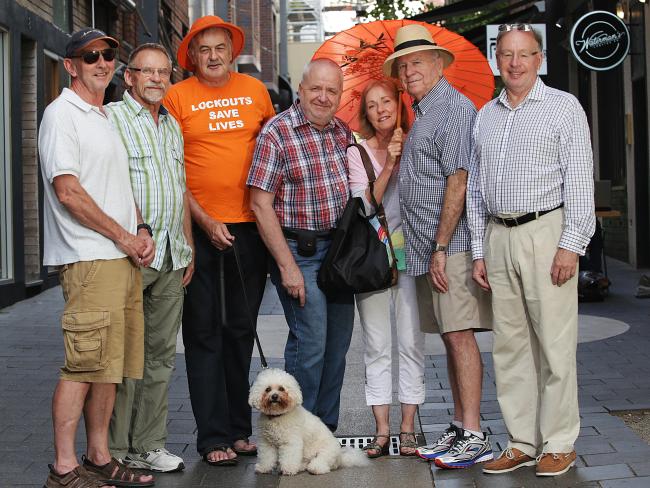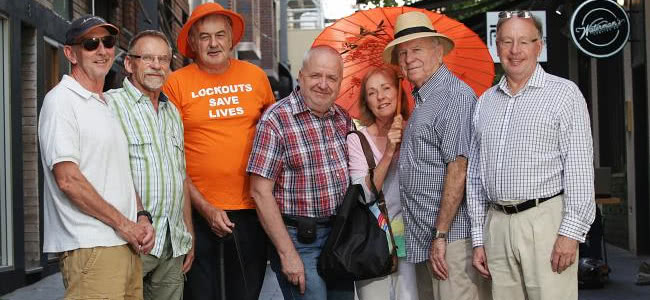We’ve heard all the sobering statistics surrounding Sydney’s lockout laws. 42 bars, clubs, venues, and restaurants closed; 16 shutting doors in Kings Cross alone; an 80-percent drop in foot traffic in lockout-affected areas, and the list goes on.
Some of the numbers are clear cut, like the dip in live performance ticket sales in the Sydney CBD (40 percent). Other numbers are a little harder to calculate, like just how many Sydney residents actually support the seemingly unpopular laws.
On Sunday, more than 15,000 Sydney-siders turned out for the Keep Sydney Open rally to protest the lockouts. Meanwhile, media outlets are reporting that a recent Galaxy poll by an anti-alcohol lobby found that an overwhelming majority support the lockouts (80 percent).
Of course, their findings came from a sample size of just 350 respondents, which is hardly conclusive. But as The Daily Telegraph notes, there is a continent of Kings Cross residents who not only support the laws, they believe them responsible for revitalising the area.
In a letter to NSW Premier Mike Baird thanking him for the lockout laws, Helen Crossing of the 2011 Residents Association said the laws were responsible for “resounding changes to the quality of life” of residents in what was once a Sydney nightlife hub.
“As residents of the Kings Cross area, we have seen the negative influence of highly-concentrated alcohol outlets in a small area, resulting in overindulgence in alcohol with endless brawls, mindless violence, a general ambience of danger, and injured bodies being carried away by paramedics,” Ms Crossing wrote.
“Now, after years of violence on our streets, residents report a new sense of safety in Kings Cross.”“Now, after years of violence on our streets, residents report a new sense of safety in Kings Cross, Potts Point and surrounding areas.” The 2011 Residents Association will be making a submission to the government’s upcoming independent review of the lockouts.
Meanwhile, Andrew Woodhouse, President of the Potts Point Kings Cross Heritage Society, told News Corp, “There has been a massive drop in alcohol-related violence on the streets and an increase in the diversification of shops now that some clubs have closed.”
Mr Woodhouse insisted that “lockouts save lives”. However, according to research undertaken before and after the lockouts were implemented, due to the considerable drop in foot traffic, the chance of being assaulted in the Cross has actually gone up by 15 percent.

2011 Residents Association (Photo via News Corp)
Speaking to The Daily Telegraph, Keep Sydney Open’s Tyson Koh said shutting down two once-vibrant areas of Sydney is not the answer to curbing violence and that cities like Amsterdam, Berlin, and even Melbourne have successfully implemented alternative approaches.
“We would like to see measures put in place that borrow from other global entertainment precincts, for example cities like Amsterdam, Melbourne, NYC, because they’re more appropriate comparisons to Sydney than Newcastle,” he said.
It’s easy to see where the members of the 2011 Residents Association are coming from. After all, their only argument is that the laws have made their area a more pleasant place to live and they believe it’s thanks to the lockouts.
[include_post id=”472081″]
Their priorities for what makes a place pleasant to live in obviously differs to the majority of young people in the area and if a nightclub once enjoyed by scores of young people is now a daytime business the residents might enjoy frequenting, that’s a far more attractive set of circumstances.
That said, it’s a slippery slope to argue about which businesses are worthy of a place in the community and which aren’t, especially when Kings Cross nightclubs thrived before the government’s controversial intervention.
And as for claims that “lockouts save lives”, evidence is mounting that they do nothing of the sort. Per capita assaults may have actually risen and many Kings Cross residents now report feeling unsafe as they walk the streets of what is now an empty neighbourhood.




































